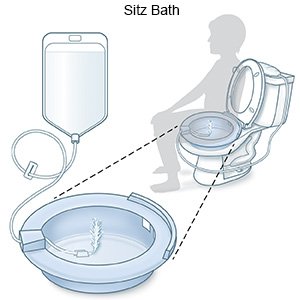Anal Fissure
Medically reviewed by Drugs.com. Last updated on Aug 4, 2025.
An anal fissure is a cut or tear in the tissue inside your anus. An anal fissure may be acute or chronic. An acute anal fissure is usually small and shallow and often heals without treatment. A chronic fissure may last longer than a month and will usually need treatment. A chronic anal fissure comes back after treatment.
DISCHARGE INSTRUCTIONS:
Seek care immediately if:
- You have severe pain in or around your anus.
- You have bleeding from your anus that does not stop.
Call your doctor if:
- You have a fever.
- You still have pain after you take pain medicine.
- You are not able to have a bowel movement.
- You have spasms in your anus that do not stop.
- You have questions or concerns about your condition or care.
Medicines:
You may need any of the following:
- Stool softeners help make your bowel movements softer. This helps prevent constipation. You will be less likely to strain and cause an anal fissure if you are not constipated.
- Topical medicines may be given to help your anal muscle relax or to increase blood flow to your anus. Your provider will teach you the right way to use topical medicine.
- Take your medicine as directed. Contact your healthcare provider if you think your medicine is not helping or if you have side effects. Tell your provider if you are allergic to any medicine. Keep a list of the medicines, vitamins, and herbs you take. Include the amounts, and when and why you take them. Bring the list or the pill bottles to follow-up visits. Carry your medicine list with you in case of an emergency.
Treatment options
The following list of medications are related to or used in the treatment of this condition.
Manage or prevent an anal fissure:
- Soak in a warm tub or take a sitz bath. A sitz bath may decrease your pain and relax your anal muscle. You may need to do this more than 1 time each day. Ask your healthcare provider for information on how to use a sitz bath.

- Eat foods that are high in fiber. This will help keep your bowel movements soft. High-fiber foods include fruits, vegetables, and whole grains.

- Drink more liquids. Liquids may help soften your bowel movements. This will help prevent you from straining. Ask your provider how much liquid you should drink each day and which liquids are best for you.
- Do not ignore the urge to have a bowel movement. Do not strain. Clean the area gently after every bowel movement.
- Avoid anal intercourse for as long as directed by your provider. Anal intercourse may make it harder for your anal fissure to heal.
Follow up with your doctor as directed:
Your doctor will need to make sure your anal fissure heals. Write down your questions so you remember to ask them during your visits.
© Copyright Merative 2025 Information is for End User's use only and may not be sold, redistributed or otherwise used for commercial purposes.
The above information is an educational aid only. It is not intended as medical advice for individual conditions or treatments. Talk to your doctor, nurse or pharmacist before following any medical regimen to see if it is safe and effective for you.
Learn more about Anal Fissure
Treatment options
Care guides
Further information
Always consult your healthcare provider to ensure the information displayed on this page applies to your personal circumstances.
